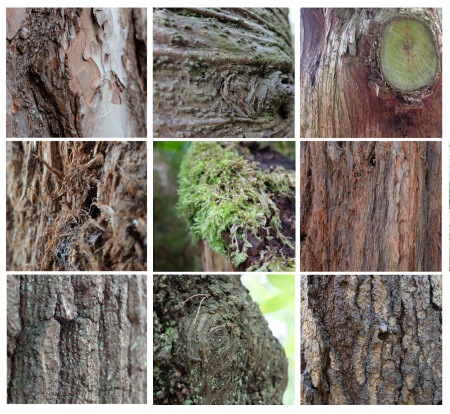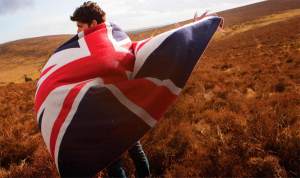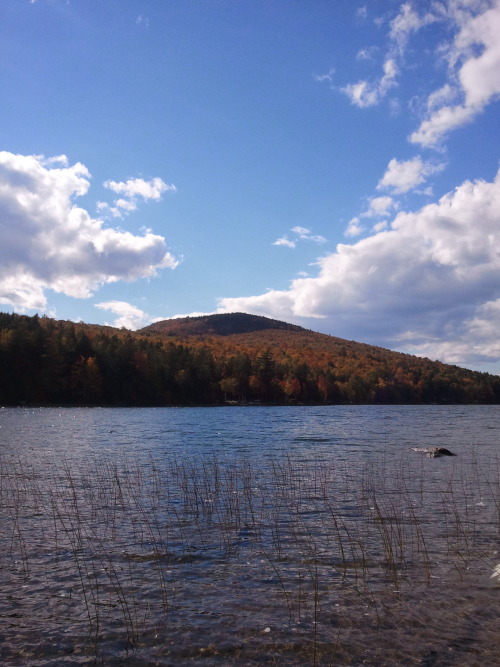 My sketches are the gimpy eye and palsied hand’s version of actual sketches, but the process of trying to draw from life does bring one’s attention to a pinpoint focus. In trying to capture and shape a few trees set off against a Maine lake, the eye must go to the details — what is the point of the drawing if it is not an attempt to reflect the reality of these particular trees? One must come closer. Look at the texture of the bark, at its ridge lines, shadings of colors, intersections of branches. Consciously measure the three dimensionality of branches, sky, closer branches, the lake, the sun on the lake, the crossing patterns formed by the whole image and by its single elements — each visual bit is an event in itself. Singularity is the reality of the world. Rise from the chair. Step towards the trees. See more shades in the bark, now fungus, now a spider web like gossamer, invisible until this moment. Closer. The spider presents itself, tiny and pale. Each step changes the light and that changes everything. One is left with a limitless, mutable image that can only be resolved by an arbitrary framing, but doing so confines the actual complexity of what is real.
My sketches are the gimpy eye and palsied hand’s version of actual sketches, but the process of trying to draw from life does bring one’s attention to a pinpoint focus. In trying to capture and shape a few trees set off against a Maine lake, the eye must go to the details — what is the point of the drawing if it is not an attempt to reflect the reality of these particular trees? One must come closer. Look at the texture of the bark, at its ridge lines, shadings of colors, intersections of branches. Consciously measure the three dimensionality of branches, sky, closer branches, the lake, the sun on the lake, the crossing patterns formed by the whole image and by its single elements — each visual bit is an event in itself. Singularity is the reality of the world. Rise from the chair. Step towards the trees. See more shades in the bark, now fungus, now a spider web like gossamer, invisible until this moment. Closer. The spider presents itself, tiny and pale. Each step changes the light and that changes everything. One is left with a limitless, mutable image that can only be resolved by an arbitrary framing, but doing so confines the actual complexity of what is real.
Tree Trail by Wahida Yakuub
How did the world become so intricate?
Our neighbors next door come roaring down to the lake, two 32 year old Brits, ex-military, robust and possessing a martial sense of organization and ambition — they keep pushing their energies forward — they run, swim, fish, and now jump into and push off in the canoe — that is the point of this vacation for them, to keep moving, “to bushwhack our way through to the bloody top” Lewis says in describing their decision to climb a trackless mountain.
 That evening we build a fire and ask them over for wine and conversation. We want other sparks in the room tonight — we want to know about the lives they have lived.
That evening we build a fire and ask them over for wine and conversation. We want other sparks in the room tonight — we want to know about the lives they have lived.
Both Giles and Lewis make their homes in Portsmouth, the great naval base on the Southern coast of the UK. Lewis runs his own bank, a nervy enterprise; he risks large sums of money everyday on loans and collateral bets, but he has the “stomach for it” he says. Giles is a lawyer, litigator, a deal maker and negotiator who is at the point of his firm’s business connections.
There are only four of us in the room, and we measure, approach, retreat, deflect, inquire, find a good path and stay on it for a while, read body language, read tone, abruptly steer clear of something sensitive, laugh, smile, grow serious, mix those expressions up, pour more wine, calm the dogs, begin anew, dodge, engage, reveal, lean forward, find a common interest, argue, question — the myriad responses and actions of human beings striving to make a connection.
We talk about the Scottish Independence Referendum and about Brussels bureaucrats. Giles was happy that Scotland stayed. Lewis was ready to let them go. Lewis likes the UKIP, the UK version of the Tea Party. He says, “I care about my friends, my family, my people, my town, nothing else.” Giles, uncomfortable with political talk, moves about in his chair and says, “This is wasted time. Politicians are wasted time. Every time I vote, I vote for a different lot.” We go quiet all at once. We seek to redirect, renew, shift directions, shift tone, dull the edges.
How did the world become so intricate?
 Sitting there, I think back to the afternoon. Giles has been researching his family. Some came to the States. One spent time in the mines in Scranton, but his great grandfather times three fought in the Peninsular War under Wellington, and after mustering out of HM Army, emigrated to the US in 1818 and made his way to the Brazos River in present day Texas. After the War of Independence in 1835, he was hired as a Texas Ranger to fight the Comanches. By 1846 he was working as a judge and teacher. Giles runs his hands over his short hair. Lewis tosses in asides — “C’mon mate, don’t be shy. Tell him you also have degrees in Archeology and a Masters in History.” He tosses corn chips to the dogs. Giles laughs, his feet resting on a canoe. “Yes,” Giles says, “the blood that flows through me flowed through a Welsh cowboy two hundred years ago.” He laughs again.
Sitting there, I think back to the afternoon. Giles has been researching his family. Some came to the States. One spent time in the mines in Scranton, but his great grandfather times three fought in the Peninsular War under Wellington, and after mustering out of HM Army, emigrated to the US in 1818 and made his way to the Brazos River in present day Texas. After the War of Independence in 1835, he was hired as a Texas Ranger to fight the Comanches. By 1846 he was working as a judge and teacher. Giles runs his hands over his short hair. Lewis tosses in asides — “C’mon mate, don’t be shy. Tell him you also have degrees in Archeology and a Masters in History.” He tosses corn chips to the dogs. Giles laughs, his feet resting on a canoe. “Yes,” Giles says, “the blood that flows through me flowed through a Welsh cowboy two hundred years ago.” He laughs again.
One must come closer.
The Sun is low and hitting the reds and oranges on the trees on the shore opposite us. We are drinking beer on a lake in Maine, and for this hour at least, mates all, laughing and not worrying about one thing.
But this evening that degree of comfort has vanished. We cannot find it again. The fire smokes. The dogs are restless. We say our civilized goodbyes. Too bad, I think, too bad. We have lost our way through the labyrinth tonight. Hit and miss. We have missed it.
I do not think we ever stop learning how to find our way through the intricacy of this life.